- Home
- Anna Campbell
The Seduction of Lord Stone
The Seduction of Lord Stone Read online
Published by Anna Campbell
Copyright 2015 Anna Campbell
Cover Design: © Hang Le
ISBN: 978-0-9863160-5-0
All rights reserved. No part of this book may be reproduced in any form or by any electronic or mechanical means, including information storage and retrieval systems - except in the case of brief quotations embodied in critical articles or reviews - without permission in writing from the author, Anna Campbell. This book is a work of fiction. The characters, events, and places portrayed in this book are products of the author’s imagination and are either fictitious or are used fictitiously. Any similarity to real persons, living or dead, is purely coincidental and not intended by the author.
License Notes
This ebook is licensed for your personal enjoyment only. This ebook may not be re-sold or given away to other people. If you would like to share this book with another person, please purchase an additional copy for each recipient. If you’re reading this book and did not purchase it, or it was not purchased for your use only, then please return to your ebook retailer and purchase your own copy. Thank you for respecting the hard work of this author.
Acknowledgements
Thanks to Ann, Christine and Sharon for going above and beyond.
TABLE OF CONTENTS
Acknowledgements
Prologue
Chapter One
Chapter Two
Chapter Three
Chapter Four
Chapter Five
Chapter Six
Chapter Seven
Chapter Eight
Chapter Nine
Excerpt: Tempting Mr. Townsend (the Dashing Widows Book 2)
Chapter One
Chapter Two
About the Author
Prologue
Grosvenor Square, London, February 1820
The world expected a widow to be sad.
The world expected a widow to be lonely.
The world didn’t expect a widow to be bored to the point of throwing a brick through a window, just to shatter the endless monotony of her prescribed year of mourning.
Outside the opulent drawing room, fashionable Grosvenor Square presented a bleak view. Leafless trees, gray skies, people scurrying past wrapped up beyond recognition as they rushed to be indoors again. Even inside, the winter air kept its edge. The bitter weather reflected the chill inside Caroline, Lady Beaumont; the endless fear that she sacrificed her youth to stultifying convention. She sighed heavily and flattened one palm on the cold glass, wondering if there would always be a barrier between her and freedom.
“You’re out of sorts today, Caro,” Fenella, Lady Deerham, said softly from where she presided over the tea table. While Caroline was this afternoon’s hostess, habit—and good sense—saw Fenella dispensing refreshments. She was neat and efficient in her movements, unlike Caroline who tended to gesticulate when something caught her attention. Fenella would never spill tea over the priceless Aubusson carpet.
“It’s so blasted miserable out there.” Caroline still stared discontentedly at the deserted square. “I don’t think I’ve seen the sun in three months.”
“Now, you know that’s an exaggeration,” Helena, Countess of Crewe, said from the gold brocade sofa beside the roaring fire.
How like Helena to stick to facts. On their first meeting, this intellectual, sophisticated woman had terrified Caroline. She’d since learned to appreciate Helena’s incisive mind and plain speaking—most of the time.
Nor would anyone have predicted Caroline’s friendship with Fenella. Fenella was gentle and sweet, and at first, Caroline had dismissed her as a bit of a fool. But after a year’s acquaintance, she recognized Fenella’s kindness as strength not weakness, a strength that threw an unforgiving light on her own occasional lack of generosity.
She’d met Helena Wade and Fenella Deerham at one of the dull all-female gatherings designated suitable entertainment for women grieving the loss of a spouse. Their youth—all three were under thirty—had drawn them together rather than any immediate affinity. But somehow, despite their differences, or perhaps because of them, Caroline now counted these two disparate ladies as her closest friends.
With another sigh, Caroline turned to face the room. “I doubt I’d have survived my mourning without you two.”
Helena paused in sipping her tea, her striking dark-eyed face with its imperious Roman nose expressing puzzlement. “That sounds discomfitingly like a farewell. Do you plan to abandon us for more exciting company once your official year is up?”
Fenella regarded Helena with rare reproach. “Don’t tease her. She’s only saying what’s true for all of us.”
“Exactly, Fen.” Caroline sent the pretty blonde in the plain gray dress a grateful smile. “Trust our resident dragon to puncture my sentimental bubble.”
Helena, slender and elegant in her widow’s weeds—Caroline envied her friend’s ability to create style from crepe and bombazine—watched her thoughtfully, not noticeably gratified by the declaration. “Nonetheless your seclusion ends next month. No wonder you’re champing at the bit.”
Horsy terms littered Helena’s conversation. She was by reputation a punishing rider, although bereavement had curtailed her exercise.
“Aren’t you?” Caroline crossed to extend her delicate Meissen cup for more tea.
“Devoting a year of my life to the memory of a brute like Crewe is hypocritical at the very least. Not to mention an infernal waste of time in the saddle.”
“Seclusion must chafe when you didn’t love your husband,” Caroline said, taking a sip.
Helena’s gaze didn’t waver. “You didn’t love yours either.”
Caroline wanted to protest, but the sad truth was that Helena was right. Freddie had been a stranger when she’d married him, and their years together hadn’t done much to increase the intimacy. Marriage was a cruel yoke, uniting such an incompatible pair. Even crueler that she’d been forced to follow Freddie’s dictates as to where they lived and what they did. Mourning him was the last obligation she owed her late husband. Once the year was over, she meant to enjoy her independence and never surrender it again.
“Helena!” Fenella said repressively as she refilled the other cups. “We both know Caro was fond of Beaumont.”
Helena’s laugh was grim. “The way she’s fond of a dog, Fen?”
In the stark afternoon light, Fenella’s beauty was ethereal. “You’re unkind.”
Helena shook her glossy dark head. “No, I’m honest. Surely after all these months, it’s time we spoke openly to one another.” A trace of warmth softened her cool, precise voice. “Because you’ve both proven my salvation, too. I would have run mad without you to remind me that other people have feelings, Fen. Caro, I never have to pretend with you. And for some reason you both seem to like me anyway.”
Helena generally steered clear of emotion. This was the closest she’d ever ventured to confidences. Surprised, Caroline studied her, seeing more than she ever had before. At last, she glimpsed the deep reserves of feeling lurking beneath that self-assured exterior.
“Mostly,” she said in a dry tone, knowing Helena would take the response the way it was meant.
“So did you love Frederick Beaumont?” Helena persisted.
Poor Freddie, saddled with a weak constitution and an unloving helpmeet. Hatred would have been a greater tribute than his wife’s indifference. How sad for a decent, if tedious man to die so young. Sadder that nobody in particular cared that he’d gone.
“No,” she said hollowly, at last voicing the shameful truth. “Although he was a good man and he deserved better from me than he got.�
�
Freddie should have married a stolid farmer’s wife, not a restless, curious, volatile creature who dreamed of the social whirl instead of milk yields and barley prices. By the end of Caroline’s ten years in Lincolnshire, she’d felt like she drowned in mud. She sucked in a breath of London air, reminding herself that now she was free.
“Well, Crewe deserved considerably less than he got from me,” Helena said sourly. “He wasn’t even any good in bed. If a woman must wed a degenerate rake, the least she should expect is physical satisfaction.”
Fenella was blushing. She always looked about sixteen when she was embarrassed. “Well, I loved Henry. And he loved me.” She sounded uncharacteristically defiant. “I’ll always miss him.”
Fenella’s happy marriage always filled Caroline with a mixture of envy and disbelief—and guilt that she couldn’t mourn Freddie with an ounce of the same sincerity. But if she needed an example of the dangers of a close union, she merely needed to glimpse the sorrow in Fen’s fine blue eyes.
Helena regarded Fenella with fond impatience. “You were lucky to have a good man, Fen. But Waterloo was five years ago, and you’re still wearing half mourning. Isn’t it time to start living again?”
Fenella paled at Helena’s unprecedented candor. She rarely heard a word of criticism. Caroline had long ago noticed that Fenella’s air of fragility made people treat her like glass, ready to shatter at the slightest rough treatment.
“You don’t understand. It’s different for me,” Fenella stammered.
“Because of your son?” Caroline asked, wondering for the thousandth time how different her marriage might have been if God had granted her children. Would she have felt so trapped, so frustrated, so useless? Who knew?
“Brandon’s only ten. He needs me.”
“And you’re only twenty-nine,” Helena retorted. “You need to look for love again.”
“I don’t want love,” Fenella said stiffly. She bit her lip and turned a tragic gaze on her friends. “It hurts too much to lose it.”
With that stark statement, confirming Caroline’s doubts about even a loving marriage, the spate of confidences slammed to a shuddering halt. A desolate silence descended on the luxurious room. Only the crackling fire and a spatter of raindrops on the windows broke the quiet.
Eventually Helena smiled, but Caroline saw the effort it took. “I’m sorry, Fen. I’m as blue-deviled as Caro. It must be the weather. I have no right to harangue you.”
Caroline gestured, sloshing her tea into the saucer, and spoke with sudden urgency. “We all have the right to offer our opinion. It’s what people do when they care.”
Annoyance banished Fenella’s distress, thank goodness. For a few moments there, Caroline had worried that her usually serene friend might dissolve into tears. “So you too believe I should forget the best person I’ve ever known, a faithful husband, a loving father, a brave soldier?”
For safety’s sake, Caroline set her cup on the tea table before she slid into the chair beside Fenella’s. When she took Fenella’s hand, she wasn’t surprised to find it trembling. “You’ll never forget him. And neither you should. But Henry wouldn’t want you to hide away from the outside world, not when you’re young and beautiful with so much to give. The man you’ve described would never be so mean spirited.”
Fenella’s grip tightened. “I’m not brave like you and Helena. I’m comfortable in my rut. The truth is that I’m afraid of facing the world again, especially without Henry by my side.”
“It’s brave to admit your fear,” Helena said from the sofa in an unusually subdued voice. “And you’re wrong about my courage. I might act as if I’m ready to take on the world, but I’ve already had one disastrous marriage. Choosing a pig like Crewe, especially when I defied my parents to have him, puts my judgment in serious question.”
“Oh, Helena.” Fenella’s lovely face softened with compassion. “You’ve learned from your mistakes. And you were so young then.”
“We were all young,” Caroline said in a low voice. “We’re still young.”
Freddie had been young, too. But at least he’d led the life he chose. Until illness struck him down, he’d been blissfully happy in the muck and mire of his fields. Caroline realized that if she died tomorrow, she’d never done a single thing she wanted. That seemed even more of a waste than Freddie’s lingering death. She’d devoted three long years to nursing him. She’d emerged from those harrowing days painfully aware of life’s brevity and how easily the years could slip away with nothing to show for them but drudgery.
“What about you, Caro?” Helena asked. “This gray day has us stripping our souls bare. We’ve started telling the truth. We may as well continue. What frightens you?”
Gathering her dark, confused thoughts, Caroline stared blindly into the fire. Pictures from the barren past filled her mind. Her austere girlhood, the only child of elderly parents with rigid ideas of behavior. Her seventeen-year-old self marrying stodgy, tongue-tied Freddie Beaumont with not a shred of romance to brighten the occasion. Ten dreary years as a farming baronet’s wife in wet, windy Lincolnshire, with no company but the equally dreary neighbors and a prize dairy herd. This last uneventful year in London as she waited out her period of mourning for a man who had left little impression on her, however much she might pity his untimely death.
“Caro?” Fenella prompted gently. “Helena’s right. If we can’t be candid with one another, who can we be candid with?”
Caroline swallowed to shift the boulder of emotion jamming her throat. Guilt at not grieving for Freddie as a wife should. Lifelong dissatisfaction. A burning need to forge her own path. She loathed the restrictions of mourning. To use Helena’s terminology, she’d kicked against convention like a half-broken horse in a narrow stall.
But her festering restlessness had a deeper cause. She was no different to Fenella and Helena. She too was terrified. And the admission nearly choked her.
She straightened until her back was stiff as a ruler, the way she’d been trained to sit as a girl groomed to marry her father’s wealthy godson Frederick Beaumont. “I dread that what’s to come will be as dull as what’s past. I dread that I’ll die without ever having lived.” She met her friends’ eyes. “And I have a raging hunger for life.”
“Oh, Caro.” Fenella placed one arm around her shoulders and squeezed. “It’s not too late.”
“We all deserve some excitement,” she said huskily, finding comfort in Fen’s hug. “I feel like I’ve been locked away in the dark all my life. I’ve spent twenty-eight years waiting. I’ve never had a chance to laugh and dance and carry on romantic intrigues.”
“What’s stopping you now?” Helena asked. “You’re beautiful and rich and ripe for adventure.”
As her fretfulness drained away, Caroline dredged up a smile for her friend. Then the smile widened as she considered what Helena had said. Truly what was stopping her now? Nothing but cowardice. The fear of the unknown, even if what she’d known had made her feel buried alive.
Well, no longer. Her parents had gone. Freddie had gone. She remained, and it was up to her to seize her liberty with both hands. If she didn’t, the only person she’d have to blame was herself.
She sucked in another breath, and for the first time in over a decade felt her lungs expand without restriction. On a sudden, intoxicating surge of hope, she rose from the spindly chair. “I’m definitely rich and ripe for adventure.”
“Once you’re out of mourning, you’ll be the most dashing widow in London,” Fenella said.
“I shall indeed.”
Fenella smiled at her. “When you set your mind to something, you make sure you achieve it. I so admire your strength.”
“My father called it blind stubbornness,” she admitted. “He tried to beat it out of me, but he never did.”
“Thank goodness,” Helena said. “You wouldn’t be nearly so interesting if you just accepted your fate. In fact, you’d still be wiping the mud off your sho
es in Lincolnshire.”
“I am determined to make a new life, one where the decisions are mine.” Caroline shifted until she could see both women. “In fact, why don’t we all leave our old, sad days behind? Why don’t we all become dashing widows?”
Helena’s dark eyes flared with excitement. Predictably Fenella looked less enamored with the idea. “I can see you both dazzling the ton. I’m not like that.”
Refusing to let Fen shrink back into her seclusion, Caroline caught her hands and hauled her to her feet. “You’re the prettiest girl I know, Fenella Deerham. You’ll dazzle the ton purely by turning up.”
“I’m not sure,” Fenella murmured.
Less impetuously, Helena stood and crossed the room to join them. “Don’t you want to dance the night away and drink champagne and flirt with handsome gentlemen?”
Fenella still resisted the rising mood. “I don’t want to marry again.”
Caroline laughed, caught up in the idea of breaking free of stifling limitations. “Dashing widows don’t have to marry. They’ve done their duty. Dashing widows have fun.”
A reluctant smile tugged at Fenella’s lips. “I can’t remember the last time I had fun.”
“There you are, then,” Helena said. “We’ll all be dashing widows.”
With a giddy laugh, Caroline stepped across to ring for a servant. “We’ll be the most dashing widows the ton has ever seen.”
“Count me in,” Helena said, and for once her expression held no trace of irony.
“Fen, you can’t turn the terrible trio into a desperate duo,” Caroline urged.
Fenella still looked unconvinced. “It’s so long since I was out in society.”
“I’ve never been out in society. My father wouldn’t pay for a season when the match with Freddie was already arranged,” Caroline said. “Helena will have to be our guide.”
Helena’s lips twitched. “Heaven help us, then.” Earnestness deepened her voice. “Come and join us, Fen. We’re not asking you to run a steeplechase in your petticoat. We’re just inviting you to chance a step out of your safe little cave. You commit to nothing more than wearing colors and attending a party or two.”
Something new sparked in Fenella’s eyes, banishing her customary melancholy. She raised her chin with un-Fenella-like brio. “Very well. I’ll do it.”
“Wonderful,” Helena said, hugging her with un-Helena-like exuberance.
The butler entered the room. Caroline greeted him with a smile and caught his surprise at the festive atmosphere. Another signal, should she need one, that it was time she crawled out of her slough of self-pity and made plans for her independence.
“Hunter, champagne.”
“Caro, at five o’clock in the afternoon?” Fenella asked, shocked.
Hunter bowed, his imperturbability back in place. “Very good, my lady.”
Caroline beamed, the pall of boredom and frustration shifting from her shoulders. She felt light enough to float up into the cloudy winter sky. From what she saw of her friends, they too had found fresh purpose on this February afternoon.
“Why not? Dashing widows drink champagne whenever they feel like it. What better excuse than a toast to our glittering success?”

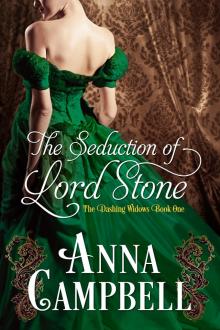 The Seduction of Lord Stone
The Seduction of Lord Stone The Highlander’s Defiant Captive: The Lairds Most Likely Book 4
The Highlander’s Defiant Captive: The Lairds Most Likely Book 4 The Highlander’s English Bride: The Lairds Most Likely Book 6
The Highlander’s English Bride: The Lairds Most Likely Book 6 The Highlander’s Christmas Quest: The Lairds Most Likely Book 5
The Highlander’s Christmas Quest: The Lairds Most Likely Book 5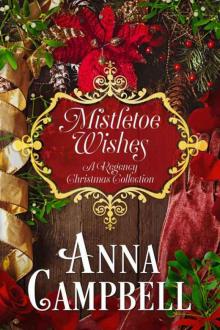 Mistletoe Wishes
Mistletoe Wishes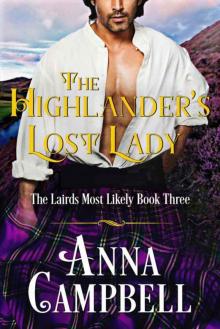 The Highlander's Lost Lady
The Highlander's Lost Lady Two Secret Sins
Two Secret Sins The Highlander's Christmas Quest
The Highlander's Christmas Quest The Highlander's Defiant Captive
The Highlander's Defiant Captive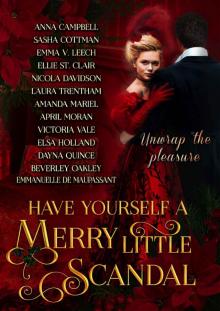 Have Yourself a Merry Little Scandal: a Christmas collection of Historical Romance (Have Yourself a Merry Little... Book 1)
Have Yourself a Merry Little Scandal: a Christmas collection of Historical Romance (Have Yourself a Merry Little... Book 1) The Laird's Christmas Kiss
The Laird's Christmas Kiss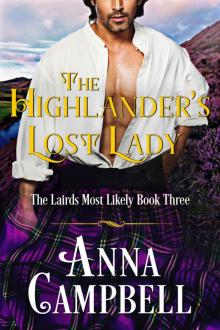 The Highlander’s Lost Lady: The Lairds Most Likely Book 3
The Highlander’s Lost Lady: The Lairds Most Likely Book 3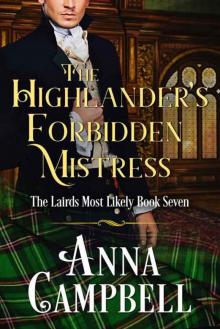 The Highlander's Forbidden Mistress
The Highlander's Forbidden Mistress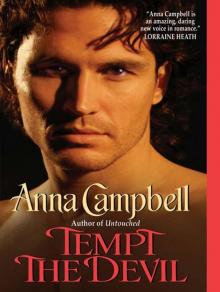 Tempt the Devil
Tempt the Devil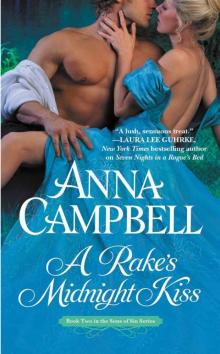 A Rake's Midnight Kiss (Sons of Sin)
A Rake's Midnight Kiss (Sons of Sin)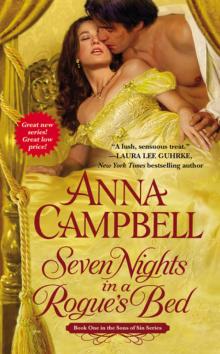 Seven Nights in a Rogue's Bed
Seven Nights in a Rogue's Bed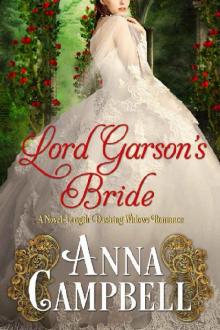 Lord Garson’s Bride
Lord Garson’s Bride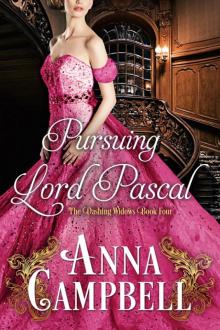 Pursuing Lord Pascal
Pursuing Lord Pascal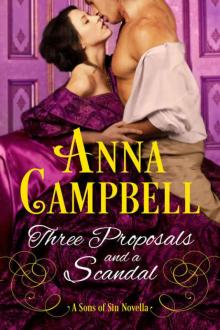 Three Proposals and a Scandal: A Sons of Sin Novella
Three Proposals and a Scandal: A Sons of Sin Novella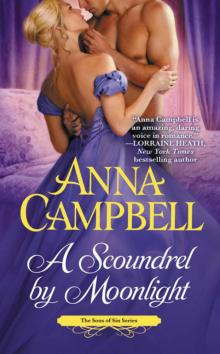 A Scoundrel by Moonlight
A Scoundrel by Moonlight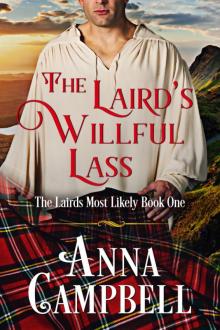 The Laird's Willful Lass
The Laird's Willful Lass The Winter Wife
The Winter Wife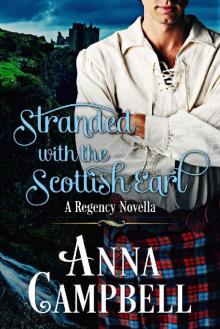 Stranded With The Scottish Earl
Stranded With The Scottish Earl The Laird’s Christmas Kiss: The Lairds Most Likely Book 2
The Laird’s Christmas Kiss: The Lairds Most Likely Book 2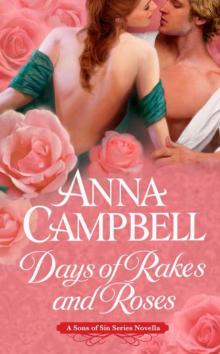 Days of Rakes and Roses
Days of Rakes and Roses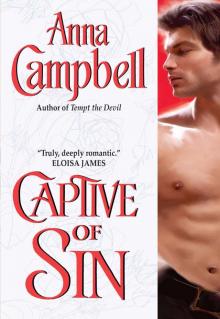 Captive of Sin
Captive of Sin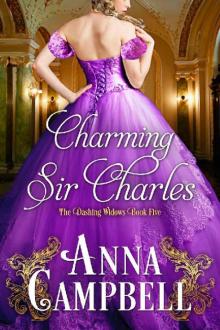 Charming Sir Charles (Dashing Widows Book 5)
Charming Sir Charles (Dashing Widows Book 5)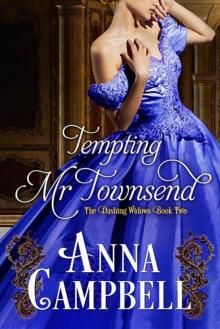 Tempting Mr. Townsend (Dashing Widows)
Tempting Mr. Townsend (Dashing Widows)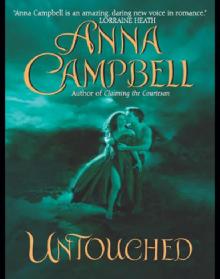 Untouched
Untouched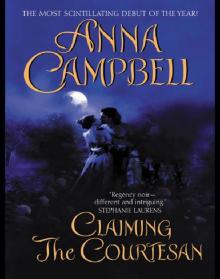 Claiming the Courtesan
Claiming the Courtesan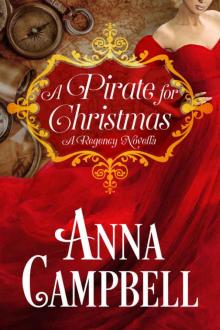 A Pirate for Christmas: A Regency Novella
A Pirate for Christmas: A Regency Novella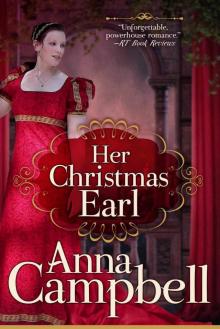 Her Christmas Earl
Her Christmas Earl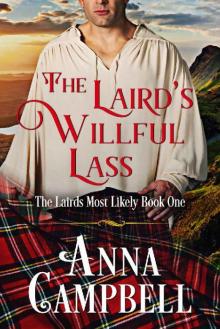 The Laird's Willful Lass (The Likely Lairds Book 1)
The Laird's Willful Lass (The Likely Lairds Book 1)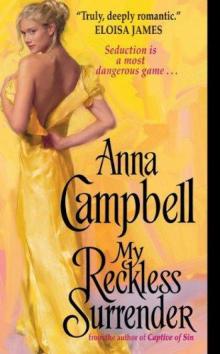 My Reckless Surrender
My Reckless Surrender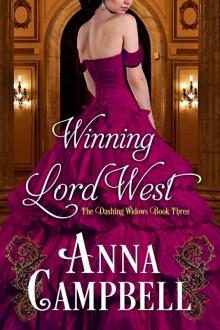 Winning Lord West
Winning Lord West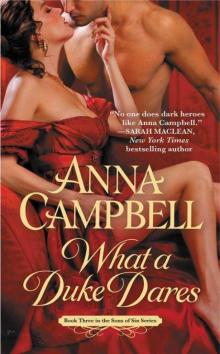 What a Duke Dares
What a Duke Dares